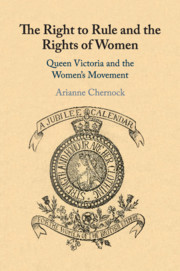'How did, could, and should women hold political power? Arianne Chernock ingeniously probes invocations and imaginings of Queen Victoria to deliver an entirely fresh account of British women’s rights. This elegant, perceptive book will be as valuable for historians of the Victorian era as it is resonant for anyone interested in how sovereignty and political activism work.'
Maya Jasanoff - Harvard University, Massachusetts
'A careful analysis of what two opposing political movements - women’s rights activists and social conservatives - saw when they looked at Victoria, and the uses to which each group tried to put the Queen. Chernock’s argument that anti-suffragists helped lay the foundation for Britain’s profoundly apolitical modern monarchy is provocative, new, and important.'
Susie Steinbach - Hamline University, Minnesota
'Chernock makes scrupulous use of myriad digital and original primary sources (periodicals, pamphlets, papers, letters, etc.) in this essential analysis of how the British women's movement, notwithstanding Victoria's silent opposition and the partisan manipulation of her name, gained the same parliamentary suffrage as men in 1918, when power politics aligned better with moral right.’
J. T. Mellone
Source: Choice
‘Chernock’s excellent book deserves wide readership. This deeply researched, smart, and well-crafted work does more than explore the relationship of Queen Victoria to the women’s movement. It provides a valuable analysis of political movements and the power of representation more generally, and explains one of the most important developments in British politics in the nineteenth century. Its lessons resonate to this very day.’
Susan Kingsley Kent
Source: The Journal of Modern History
'Chernock’s contribution is both entirely unique and offers a fascinating new interpretation of one aspect of the monarch’s life.'
Connor E. R. DeMerchant
Source: Royal Studies Journal
‘Excellent as her discussion of feminist uses of Queen Victoria is, the most interesting and important aspect of this outstanding book is Charnock’s thorough and insightful analysis of the gendering of ideas about monarchy and the state by those who opposed women’s rights.’
Barbara Caine
Source: Victorian Studies
‘Chernock provides an important analysis of the Victorian era women’s movement and how the representation of regnant queens participated in such a heated debate for the rights of Britain’s female citizens.'
Mindy Williams
Source: Anglican and Episcopal History Review



